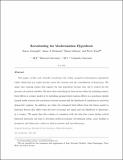Reevaluating the modernization hypothesis
Author(s)
Acemoglu, Daron; Johnson, Simon; Robinson, James A.; Yared, Pierre
DownloadJohnson_reevaluating-the-modernization-hypothesis.pdf (212.2Kb)
OPEN_ACCESS_POLICY
Open Access Policy
Creative Commons Attribution-Noncommercial-Share Alike
Terms of use
Metadata
Show full item recordAbstract
We revisit and critically reevaluate the widely accepted modernization hypothesis which claims that per capita income causes the creation and the consolidation of democracy. Existing studies find support for this hypothesis because they fail to control for the presence of omitted variables. Controlling for these factors either by including country fixed effects in a linear model or by including parameterized random effects in a nonlinear double hazard model removes the correlation between income and the likelihood of transitions to and from democratic regimes. In addition, the estimated fixed effects from the linear model are related to historical factors that affect both the level of income per capita and the likelihood of democracy in a country. This evidence is consistent with the idea that events during critical historical junctures can lead to divergent political–economic development paths, some leading to prosperity and democracy, others to relative poverty and non-democracy.
Date issued
2009-10Department
Massachusetts Institute of Technology. Department of Economics; Sloan School of ManagementJournal
Journal of Monetary Economics
Publisher
Elsevier
Citation
Acemoglu, Daron et al. “Reevaluating the modernization hypothesis.” Journal of Monetary Economics 56.8 (2009): 1043-1058. © 2009 Elsevier B.V.
Version: Author's final manuscript
ISSN
0304-3932